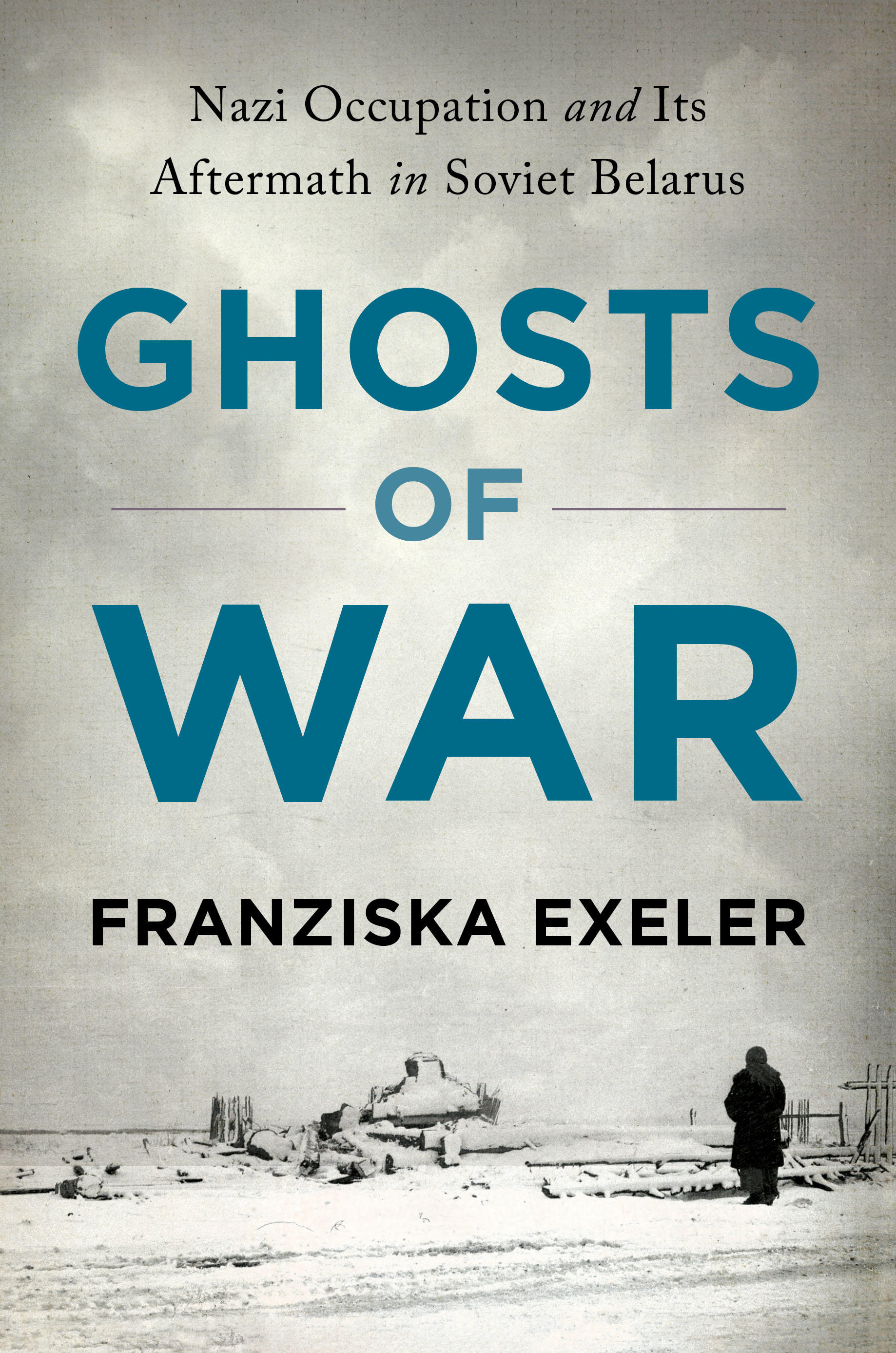Dr. Franziska Exeler

Friedrich-Meinecke-Institut
Global History
Research Associate and Lecturer (Wissenschaftliche Mitarbeiterin)
Modern Eastern Europe and Russia; War and Society; (International) Legal History; Migration, Borders and Borderland Studies
Koserstraße 20
14195 Berlin
Sprechstunde
Please email me for my office hours.
Franziska Exeler is Lecturer (equivalent to Assistant Professor) of History at Freie Universität Berlin. She is also a Research Fellow at the Centre for History and Economics at Magdalene College, University of Cambridge. Her research interests include twentieth-century East European, Russian and German history; war and society; (international) legal history and war crimes trials; myth, memory and trauma; and empire, migration, and border regimes.
Her book Ghosts of War. Nazi Occupation and Its Aftermath in Soviet Belarus was published in 2022 with Cornell University Press. It is the recipient of the 2021 Ernst Fraenkel Prize awarded by the Wiener Holocaust Library in London.
Related research analyzes how the Soviet prosecution of treason and war crimes fit into the global moment of post-Second World War justice. Ongoing, collaborative research explores comparative and transnational approaches to the Second World and its legacies in Europe and Asia. Tracing the Russian-Austrian-Prussian/German border from 1815 to 1921, a new book project examines concepts, perceptions and experiences of border regimes across Eastern Europe.
Franziska Exeler's research has been supported by the Princeton Institute for International and Regional Studies, the Social Science Research Council (International Dissertation Research Fellowship, with funds from the Andrew W. Mellon Foundation), the European University Institute (Max Weber Postdoctoral Fellowship) and the Higher School of Economics in Moscow (Postdoctoral Fellowship at the International Center for the History and Sociology of World War II and Its Consequences). She was also a visiting fellow at the Center for History and Economics at Harvard University and DAAD Visiting Assistant Professor at the Higher School of Economics in St. Petersburg, Russia.
She holds a PhD in History from Princeton University, an MA in History from Princeton University, and an MA in History, Political Sciences and Economics from Humboldt University Berlin.
Together with Diana Kim (Georgetown University), she is curating the Invisible Histories website, a platform for researchers to present photographs in context and explore hidden narratives. The project is supported by the Joint Center for History of Economics at Harvard University and the University of Cambridge. She is also co-coordinating Barriers and Borders, a research network and collaboration between Columbia World Projects and the Centre for History and Economics, supported by the Rockefeller Brothers Fund.
Winter Semester 2022/23
War Stories. Myth, Memory, and Trauma in the Twentieth Century
Empire, War, and Migration in Modern East European, Russian, and Eurasian History
Summer Semester 2022
Grenzen in Europa. Konzepte, Wahrnehmungen und Erfahrungen im 19. und 20. Jahrhundert.
The Age of Empire. Conflicts, Encounters, and Exchange in the 19th and Early 20th Century.
Summer Semester 2021
Borders. Concepts, Perceptions and Experiences in Modern History.
Der Zweite Weltkrieg in globaler Perspektive. Eine Einführung.
Summer Semester 2019
War Stories. Myth, Memory and Trauma in the Twentieth Century.
Das Rote Imperium. Einführung in die Geschichte der Sowjetunion.
Summer Semester 2018
Empire, War and Migration in Modern Russia, Eastern Europe and Eurasia.
War and Society in the Twentieth Century. A Global History.
Summer Semester 2017
War, Crimes and Law. A Global History of International Law and War Crimes Trials.
Summer Semester 2016
Empire, War and Migration in Modern Russia, Eastern Europe and Eurasia.
Trained as a historian of modern Eastern Europe, Russia and Eurasia, Franziska Exeler’s research interests include nineteenth and twentieth-century East European, Russian and German history; war and society; (international) legal history, war crimes trials and transitional justice; myth, memory and trauma; and empire, migration, and border regimes.
Her award-winning book Ghosts of War. Nazi Occupation and Its Aftermath in Soviet Belarus (published in 2022 with Cornell University Press) examines people's wartime choices and their aftermath in Belarus, a war-ravaged Soviet republic that was under Nazi occupation during the Second World War. After the Red Army reestablished control over this East European borderland, one question shaped encounters between the returning Soviet authorities and those who had lived under Nazi rule, between soldiers and family members, reevacuees and colleagues, Holocaust survivors and their neighbors: What did you do during the war?
Ghosts of War analyzes the prosecution and punishment of Soviet citizens accused of wartime collaboration with the Nazis and shows how individuals sought justice, revenge, or assistance from neighbors and courts. The book uncovers the many absences, silences, and conflicts that were never resolved, as well as the truths that could only be spoken in private, yet it also investigates the extent to which individuals accommodated, contested, and reshaped official Soviet war memory. Ghosts of War draws on archival fieldwork conducted in Belarus, Russia, Poland, Ukraine, Germany, Israel, and the United States, and a wide range of personal and autobiographical material in multiple European languages. It is often assumed that in societies that experienced war, occupation, or violent conf lict, the act of seeking justice and accountability contributes to the development of free public spheres and democratic societies (a process also known as transitional justice). In contrast, the book examines how efforts at "confronting the past" played out within, and at times through, a dictatorship.
A second research focus, developed as a post-doc project, lies on the history of international criminal law, war crimes prosecution in the twentieth century. Published work examines how the Soviet prosecution of treason and war crimes fit into the global moment of post-Second World War justice, which saw hundreds of thousands of individuals around the world prosecuted for their (real, alleged or surmised) wartime activities. Ongoing, collaborative research explores comparative and transnational approaches to the Second World War and its legacies in Europe and Asia.
A new book-length research project explores the rise of modern border regimes in those states that ruled over large parts of nineteenth and early twentieth-century Central and Eastern Europe: The Habsburg empire, the Russian empire, and first Prussia, from 1871 on the German empire. Tracing the Russian-Austrian-Prussian/German border, which cut through multi-lingual, in the majority often Polish-speaking lands, the project examines imperial practices, cross-border knowledge transfer, and everyday experiences of borders. By bringing together two land-based empires (Russia, Habsburg) with an overseas empire (Germany), yet one that also held imperial aspirations in Eastern Europe, Border Regimes asks: How did imperial discourse and practices in regions ruled as colonies affect border regimes on the European continent and vice versa? And how did imperial conflict, but also the cross-border exchange of ideas, knowledge, and technologies shape the management and experience of borders, borderlands, and human mobility?
Book:

Ghosts of War. Nazi Occupation and Its Aftermath in Soviet Belarus (Ithaca: Cornell University Press, 2022)
Recipient of the 2021 Ernst Fraenkel Prize awarded by the Wiener Holocaust Library London
Honorable Mention, W. Bruce Lincoln Book Prize 2023, awarded by the Association for Slavic, East European and Eurasian Studies (ASEEES)
- Ernst Fraenkel Prize Lecture
- Podcast interview with the CEU Review of Democracy
- Podcast interview with the New Books Network: New Books in History
- Book Talk at the Jordan Center, New York University
- Reviewed in: Russian Review, H-Soz-Kult, Journal of European History, Jahrbücher für Geschichte Osteuropas, Belaruski Histarychny Ahliad, Istoricheskaia Ekspertiza, Israel Journal of Foreign Affairs, Cahiers du monde russe, Slavonic and East European Review, Soviet and Post-Soviet Review, Sehepunkte
Journal Articles:
"Filtration Camps, Past and Present, and Russia's War Against Ukraine," in: Journal of Genocide Research, published online May 2023.
"Patrons and Partisans. Soviet State-Rebuilding, Informal Networks, and Hierarchies of Trust in Post-Nazi Occupation Belarus," in: Jahrbücher für Geschichte Osteuropas, 70, no. 3-4 (2022), 481–509.
“What Did You Do during the War? Personal Responses to the Aftermath of Nazi Occupation,” in: Kritika: Explorations in Russian and Eurasian History 17, no. 4 (2016), 805–835.
“The Ambivalent State. Determining Guilt in the Post-World War II Soviet Union,” in: Slavic Review 75, no. 3 (2016), 606–629.
“Gewalt im Militär. Die Rote Armee im Zweiten Weltkrieg” (Violence inside the Military. The Red Army in World War II), in: Zeitschrift für Geschichtswissenschaft 3 (2012), 228–246.
Book Chapters:
“Nazi Atrocities, International Criminal Law, and Soviet War Crimes Trials. The Soviet Union and the Global Moment of Post-Second World War Justice,” in: The New Histories of International Criminal Law. Retrials, edited by Immi Tallgren and Thomas Skouteris (Oxford: Oxford University Press, 2019), 189–219.
“L’Expérience de la guerre: violence et violence extrême” (The Experience of War: Violence and Extreme Violence), in: Encyclopédie de la seconde guerre mondiale, edited by Jean-François Muracciole and Guillaume Piketty (Paris: Éditions Robert Laffont, 2015), 1379–1385.
“Kogda okonchilas’ voina. Sovetskaia Belorussiia v seredine 1940-e – 1950-e gg” (When the War Was Over. Soviet Belarus from the mid-1940s to 1950s), in: Belarus’ i Germaniia. Historyia i suchasnasts’. Materyialy mizhnarodnai navukovai kanferentsyi, edited by A.A Kavaleniia and S.Ia. Novikaŭ (Minsk: MGLU, 2012), 85–92.
Academic Blog Posts and Essays:
“The Three Empire’s Border. Imperial Practices, Knowledge Transfer, and Everyday Experiences of Borders in East-Central Europe, 1815–1921.” Published on Barriers & Borders, Columbia Worlds Project and the Centre for History and Economics, Cambridge, May 2023.
"Absences." Published on Invisible Histories, a project supported by Harvard University and the University of Cambridge, November 2019.
“Soviet Collaboration Trials.” Published on Compromised Identities: Reflections on Perpetration and Complicity under Nazism, University College London, March 2019.
“Staging Justice. Trial Photography.” Published on Invisible Histories, a project supported by Harvard University and the University of Cambridge, June 2017.






